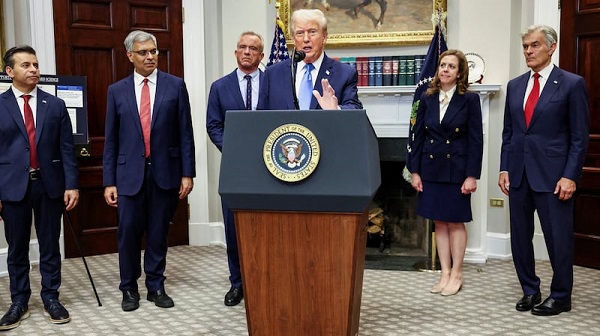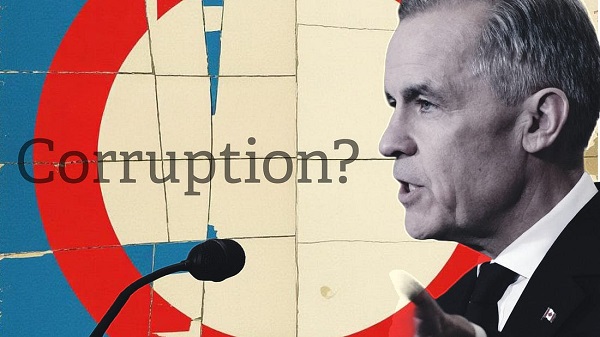Brownstone Institute
Anthony Fauci’s Very Bad Week

From the Brownstone Institute
BY
It’s not been Anthony Fauci’s best week.
Forever intent on managing his image and public opinion on the pandemic response, he accepted a seemingly safe interview on CNN. The reporter was someone he trusted, Michael Smerconish, who tossed in what he believed to be a softball question.
He asked Fauci about the Cochrane study on masks by Tom Jefferson, and, in particular the author’s comments to Brownstone fellow Maryanne Demasi. Jefferson flat out said that masks don’t work to control viruses. Smerconish simply wanted Fauci’s response.
Fauci, who might have been expected to perform better, stumbled very badly. He said that while on a population level mask evidence is weak, the evidence is stronger on an individual level. That of course is a bit of a head-scratcher, especially since he cited none of the supposed studies.
Actually, it makes no sense at all. The whole point of the Jefferson paper was to examine the best-possible evidence. The results were exactly the “science” that Fauci has touted for years. The big difference is that the results completely contradict Fauci himself. Is this guy a pathological liar?
You can watch the snippet:
CNN's @smerconish confronts Dr. Fauci with the latest evidence that masks, even N95s, made "no difference" in the pandemic. Fauci responds by basically conceding that point while adding the nonsensical claim that masks work on an "individual basis," or something.
Smerconish ends… pic.twitter.com/tZB62saxOL
— Scott Morefield (@SKMorefield) September 3, 2023
After the exchange, Smerconish reported that he texted Fauci an apology for the way the interview went, assuring him that it was not intended as a “gotcha” interview. He reported that Fauci texted him back but didn’t want to share the contents because he didn’t have permission. Interesting. I’m pretty sure that a reporter under normal circumstances would certainly share that information. But as we know, Fauci is in a league of his own.
In addition, some very interesting email correspondence came out, thanks to a FOIA request by US Right to Know. The communication to Fauci was courtesy of Fauci’s chief of staff Greg Folkers and on behalf of Fauci’s frequent co-author David Morens. The date was January 27, 2020, about the time that China’s experience with SARS-CoV-2 was making the news all over the US. (I wrote my first article against lockdowns for Covid the next day.)
“EcoHealth group (Peter Daszak et al), has for years been among the biggest players in coronavirus work, also in collaboration with Ralph Baric, Ian Lipkin and others,” wrote Folkers. In the past 5 years, and working with the Wuhan Institute of Virology, they had discovered hundreds of coronaviruses circulating in China. Further, the memo said, “clinical signs of bat SARS-CoVs in mice were not prevented with a vaccine candidate against SARS-CoV, and were not treatable with most monoclonal therapies being developed.”
Here is the full memo:
 The timing here checks out against Jeremy Farrar’s own memoir:
The timing here checks out against Jeremy Farrar’s own memoir:
“By the second week of January, I was beginning to realise the scale of what was happening. I was also getting the uncomfortable feeling that some of the information needed by scientists all around the world to detect and fight this new disease was not being disclosed as fast as it could be. I did not know it then, but a fraught few weeks lay ahead. In those weeks, I became exhausted and scared. I felt as if I was living a different person’s life. During that period, I would do things I had never done before: acquire a burner phone, hold clandestine meetings, keep difficult secrets. I would have surreal conversations with my wife, Christiane, who persuaded me we should let the people closest to us know what was going on. I phoned my brother and best friend to give them my temporary number. In hushed conversations, I sketched out the possibility of a looming global health crisis that had the potential to be read as bioterrorism. ‘If anything happens to me in the next few weeks,’ I told them nervously, ‘this is what you need to know.’”
Wow, these guys believed they would be off’d! That’s some crazy stuff there.
These weeks were the critical turning point. China had already locked down. Farrar reports that “the world had all the information it needed by 24 January: a potentially fatal novel respiratory disease that could spread between people without symptoms, with no vaccines or treatments, that had already ravaged a huge, highly connected Chinese city.”
Then the possibility of a lab leak became very obvious in these days. “In the last week of January 2020,” he writes, “I saw email chatter from scientists in the US suggesting the virus looked almost engineered to infect human cells. These were credible scientists proposing an incredible, and terrifying, possibility of either an accidental leak from a laboratory or a deliberate release.”
This fits exactly with the above memo to Fauci. It was at this point that the cool-and-collected Fauci organized the authors of what became the “Proximal Origin” paper that denied it was a lab leak, the first draft of which was circulated on February 4. Among the authors was a virologist who had worked with EcoHealth.
You can look through the entire timeline and see that this all checks out. It seems ever clearer what was going on here. Fauci and his cohorts were alerted to NIH funding of the Wuhan lab. They became convinced of the very strong likelihood that this was a lab leak, accidental or deliberate. This began to make some sense of other reports from many months earlier of sick soldiers returning from the Military World Games. They panicked and they worked on a cover-up.
Why did they panic? Was it for fear of the public health consequences of a rapidly spreading virus? More likely, they panicked that they would rightly be blamed for it because the lab was funded through a third party by US taxpayers. They must also have known that they were doing gain-of-function research: the idea that labs create viruses and then also manufacture the antidote in the form of a vaccine. But according to the report on Fauci’s desk, no vaccine works for this one or others in this class of virus.
Fauci defaulted to the only action he could think of at the time: use lockdowns to minimize the spread. His staff had already taken a junket to Wuhan and returned with a report dated February 24, 2020 that said that lockdowns worked to suppress viral spread.
Lacking any better ideas, Fauci decided to push lockdowns as a way of minimizing the damage and keeping his reputation out of harm’s way by 1) denying the lab leak with a seemingly credible paper, and 2) causing a hugely distracting amount of chaos with a lockdown that they convinced Donald Trump himself to back.
This would of course wreck the Trump presidency, which was a bonus from the point of view of the military intelligence that was already working to implement protocols from their recently concluded “germ games.”
Next in line came the necessity to involve the New York Times, which on February 28 ran an article calling for the US to “go medieval” on the virus in addition to an article by Peter Dazsak himself on the op-ed page!
Four days later, Fauci told Michael Gerson of the Washington Post on March 2, 2020, that no vaccine would be needed to get over the pandemic. “Social distancing is not really geared to wait for a vaccine,” wrote Fauci. “The epidemic will gradually decline and stop on its own without a vaccine.”
Why would he say this? Again, Fauci had been told that no vaccine in China seemed to work. Plus, he is not a stupid man – coronaviruses mutate too quickly – and had years of attempts to vaccinate against AIDS without success. So his thinking was that using force to stop the spread was the only real option for a man who was seeking to “cover his ass,” as the expression goes.
The big problem with the plan, of course, was that there was no exit strategy. As soon as you open up, the virus is going to spread anyway. This was why Fauci welcomed all attempts at creating a vaccine anyway. At least the vaccine would provide an excuse to end the lockdowns.
But just in case it did not, he worked with his co-author David Morens on a big think piece that came out in Cell in August 2020. This was the paper that said lockdowns should really be permanent.
“Living in greater harmony with nature,” they wrote, “will require changes in human behavior as well as other radical changes that may take decades to achieve: rebuilding the infrastructures of human existence, from cities to homes to workplaces, to water and sewer systems, to recreational and gatherings venues.”
Despite Fauci’s wishes, the most extreme aspects of lockdowns gradually faded away in time, most anointed experts can pretend as if the vaccine ended the worst aspects of the pandemic (that’s why the mandates became necessary, if only to maximize uptake and confound the science), and Fauci keeps going on national television, despite his age and wealth, to dial back his responsibility for any aspect of it, including the lockdowns he is on record backing from February 26, 2020, onward.
In any case, this is a summary of current knowledge. There are of course many other layers to this onion, including the early involvement of the pharmaceutical companies and the extensive intervention by the Department of Defense. Sadly, much of the necessary information to sort through that thicket is wholly classified.
Thus ends Fauci’s not-so-good week. We’ll get to the bottom of this eventually.
Author
Brownstone Institute
Trump Covets the Nobel Peace Prize

From the Brownstone Institute
By
Many news outlets reported the announcement of the Nobel Peace Prize on Friday by saying President Donald Trump had missed out (Washington Post, Yahoo, Hindustan Times, Huffington Post), not won (USA Today), fallen short (AP News), lost (Time), etc. There is even a meme doing the rounds about ‘Trump Wine.’ ‘Made from sour grapes,’ the label explains, ‘This is a full bodied and bitter vintage guaranteed to leave a nasty taste in your mouth for years.’

For the record, the prize was awarded to María Corina Machado for her courageous and sustained opposition to Venezuela’s ruling regime. Trump called to congratulate her. Given his own attacks on the Venezuelan president, his anger will be partly mollified, and he could even back her with practical support. He nonetheless attacked the prize committee, and the White House assailed it for putting politics before peace.
He could be in serious contention next year. If his Gaza peace plan is implemented and holds until next October, he should get it. That he is unlikely to do so is more a reflection on the award and less on Trump.
So He Won the Nobel Peace Prize. Meh!
Alfred Nobel’s will stipulates the prize should be awarded to the person who has contributed the most to promote ‘fraternity between nations…abolition or reduction of standing armies and…holding and promotion of peace congresses.’ Over the decades, this has expanded progressively to embrace human rights, political dissent, environmentalism, race, gender, and other social justice causes.
On these grounds, I would have thought the Covid resistance should have been a winner. The emphasis has shifted from outcomes and actual work to advocacy. In honouring President Barack Obama in 2009, the Nobel committee embarrassed itself, patronised him, and demeaned the prize. His biggest accomplishment was the choice of his predecessor as president: the prize was a one-finger send-off to President George W. Bush.
There have been other strange laureates, including those prone to wage war (Henry Kissinger, 1973), tainted through association with terrorism (Yasser Arafat, 1994), and contributions to fields beyond peace, such as planting millions of trees. Some laureates were subsequently discovered to have embellished their record, and others proved to be flawed champions of human rights who had won them the treasured accolade.
Conversely, Mahatma Gandhi did not get the prize, not for his contributions to the theory and practice of non-violence, nor for his role in toppling the British Raj as the curtain raiser to worldwide decolonisation. The sad reality is how little practical difference the prize has made to the causes it espoused. They bring baubles and honour to the laureates, but the prize has lost much of its lustre as far as results go.
Trump Was Not a Serious Contender
The nomination processes start in September and nominations close on 31 January. The five-member Norwegian Nobel committee scrutinises the list of candidates and whittles it down between February and October. The prize is announced on or close to 10 October, the date Alfred Nobel died, and the award ceremony is held in Oslo in early December.
The calendar rules out a newly elected president in his first year, with the risible exception of Obama. The period under review was 2024. Trump’s claims to have ended seven wars and boasts of ‘nobody’s ever done that’ are not taken seriously beyond the narrow circle of fervent devotees, sycophantic courtiers, and supplicant foreign leaders eager to ingratiate themselves with over-the-top flattery.
Trump Could Be in Serious Contention Next Year
Trump’s 20-point Gaza peace plan falls into three conceptual-cum-chronological parts: today, tomorrow, and the day after. At the time of writing, in a hinge moment in the two-year war, Israel has implemented a ceasefire in Gaza, Hamas has agreed to release Israeli hostages on 13-14 October, and Israel will release around 2,000 Palestinian prisoners (today’s agenda). So why are the ‘Ceasefire Now!’ mobs not out on the streets celebrating joyously instead of looking morose and discombobulated? Perhaps they’ve been robbed of the meaning of life?
The second part (tomorrow) requires Hamas demilitarisation, surrender, amnesty, no role in Gaza’s future governance, resumption of aid deliveries, Israeli military pullbacks, a temporary international stabilisation force, and a technocratic transitional administration. The third part, the agenda for the day after, calls for the deradicalisation of Gaza, its reconstruction and development, an international Peace Board to oversee implementation of the plan, governance reforms of the Palestinian Authority, and, over the horizon, Palestinian statehood.
There are too many potential pitfalls to rest easy on the prospects for success. Will Hamas commit military and political suicide? How can the call for democracy in Gaza and the West Bank be reconciled with Hamas as the most popular group among Palestinians? Can Israel’s fractious governing coalition survive?
Both Hamas and Israel have a long record of agreeing to demands under pressure but sabotaging their implementation at points of vulnerability. The broad Arab support could weaken as difficulties arise. The presence of the internationally toxic Tony Blair on the Peace Board could derail the project. Hamas has reportedly called on all factions to reject Blair’s involvement. Hamas official Basem Naim, while thanking Trump for his positive role in the peace deal, explained that ‘Palestinians, Arabs and Muslims and maybe a lot [of] people around the world still remember his [Blair’s] role in causing the killing of thousands or millions of innocent civilians in Afghanistan and Iraq.’
It would be a stupendous achievement for all the complicated moving parts to come together in stable equilibrium. What cannot and should not be denied is the breathtaking diplomatic coup already achieved. Only Trump could have pulled this off.
The very traits that are so offputting in one context helped him to get here: narcissism; bullying and impatience; bull in a china shop style of diplomacy; indifference to what others think; dislike of wars and love of real estate development; bottomless faith in his own vision, negotiating skills, and ability to read others; personal relationships with key players in the region; and credibility as both the ultimate guarantor of Israel’s security and preparedness to use force if obstructed. Israelis trust him; Hamas and Iran fear him.
The combined Israeli-US attacks to degrade Iran’s nuclear capability underlined the credibility of threats of force against recalcitrant opponents. Unilateral Israeli strikes on Hamas leaders in Qatar highlighted to uninvolved Arabs the very real dangers of continued escalation amidst the grim Israeli determination to rid themselves of Hamas once and for all.
Trump Is Likely to Be Overlooked
Russia has sometimes been the object of the Nobel Peace Prize. The mischievous President Vladimir Putin has suggested Trump may be too good for the prize. Trump’s disdain for and hostility to international institutions and assaults on the pillars of the liberal international order would have rubbed Norwegians, among the world’s strongest supporters of rules-based international governance, net zero, and foreign aid, the wrong way.
Brash and public lobbying for the prize, like calling the Norwegian prime minister, is counterproductive. The committee is fiercely independent. Nominees are advised against making the nomination public, let alone orchestrating an advocacy campaign. Yet, one laureate is believed to have mobilised his entire government for quiet lobbying behind the scenes, and another to have bad-mouthed a leading rival to friendly journalists.
Most crucially, given that Scandinavian character traits tip towards the opposite end of the scale, it’s hard to see the committee overlooking Trump’s loud flaws, vanity, braggadocio, and lack of grace and humility. Trump supporters discount his character traits and take his policies and results seriously. Haters cannot get over the flaws to seriously evaluate policies and outcomes. No prizes for guessing which group the Nobel committee is likely to belong to. As is currently fashionable to say when cancelling someone, Trump’s values do not align with those of the committee and the ideals of the prize.
Autism
Trump Blows Open Autism Debate

From the Brownstone Institute
By
Trump made sweeping claims that would have ended political careers in any other era. His health officials tried to narrow the edges, but the President ensured that the headlines would be his.
Autism has long been the untouchable subject in American politics. For decades, federal agencies tiptoed around it, steering research toward genetics while carefully avoiding controversial environmental or pharmaceutical questions.
That ended at the White House this week, when President Donald Trump tore through the taboo with a blunt and sometimes incendiary performance that left even his own health chiefs scrambling to keep pace.
Flanked by Health Secretary Robert F. Kennedy, Jr., NIH Director Jay Bhattacharya, FDA Commissioner Marty Makary, CMS Adminstrator Dr Mehmet Oz, and other senior officials, Trump declared autism a “horrible, horrible crisis” and recounted its rise in startling terms.
“Just a few decades ago, one in 10,000 children had autism…now it’s one in 31, but in some areas, it’s much worse than that, if you can believe it, one in 31 and…for boys, it’s one in 12 in California,” Trump said.
The President insisted the trend was “artificially induced,” adding: “You don’t go from one in 20,000 to one in 10,000 and then you go to 12, you know, there’s something artificial. They’re taking something.”
Trump’s Blunt Tylenol Warning
The headline moment came when Trump zeroed in on acetaminophen, the common painkiller sold as Tylenol — known as paracetamol in Australia.
While Kennedy and Makary described a cautious process of label changes and physician advisories, Trump dispensed with nuance.
“Don’t take Tylenol,” Trump said flatly. “Don’t take it unless it’s absolutely necessary…fight like hell not to take it.”
Kennedy laid out the evidence base, citing “clinical and laboratory studies that suggest a potential association between acetaminophen used during pregnancy and adverse neurodevelopmental outcomes, including later diagnosis for ADHD and autism.”
Makary reinforced the point with references to the Boston Birth Cohort, the Nurses’ Health Study, and a recent Harvard review, before adding: “To quote the dean of the Harvard School of Public Health, there is a causal relationship between prenatal acetaminophen use and neurodevelopmental disorders of ADHD and autism spectrum disorder. We cannot wait any longer.”
But where the officials spoke of “lowest effective dose” and “shortest possible duration,” Trump thundered over the top: “I just want to say it like it is, don’t take Tylenol. Don’t take it if you just can’t. I mean, it says, fight like hell not to take it.”
Vaccines Back on Center Stage
The President then pivoted to vaccines, reviving arguments that the medical establishment has long sought to bury. He blasted the practice of giving infants multiple injections at a single visit.
“They pump so much stuff into those beautiful little babies, it’s a disgrace…you get a vat of 80 different vaccines, I guess, 80 different blends, and they pump it in,” Trump said.
His solution was simple: “Go to the doctor four times instead of once, or five times instead of once…it can only help.”
On the measles, mumps, and rubella shot, Trump insisted: “The MMR, I think should be taken separately…when you mix them, there could be a problem. So there’s no downside in taking them separately.”
The moment was astonishing — echoing arguments that had once seen doctors like Andrew Wakefield excommunicated from medical circles.
It was the kind of line of questioning the establishment had spent decades trying to banish from mainstream debate.
Hep B Vaccine under Attack
Trump dismissed the rationale for giving the hepatitis B vaccine at birth.
“Hepatitis B is sexually transmitted. There’s no reason to give a baby that’s just born hepatitis B [vaccine]. So I would say, wait till the baby is 12 years old,” he said.
He made clear that he was “not a doctor,” stressing that he was simply offering his personal opinion. But the move could also be interpreted as Trump choosing to take the heat himself, to shield Kennedy’s HHS from what was sure to be an onslaught of criticism.
The timing was remarkable.
Only last week, the CDC’s Advisory Committee on Immunisation Practices (ACIP) had been preparing to vote on whether to delay the hepatitis B shot until “one month” of age — a modest proposal that mainstream outlets derided as “anti-vax extremism.”
By contrast, Trump told the nation to push the jab back 12 years. His sweeping denunciations made the supposedly radical ACIP vote look almost tame.
The irony was inescapable — the same media voices who had painted Kennedy’s reshaped ACIP as reckless now faced a President willing to say far more than the panel itself dared.
A New Treatment and Big Research Push
The administration also unveiled what it deemed a breakthrough: FDA recognition of prescription leucovorin, a folate-based therapy, as a treatment for some autistic children.
Makary explained: “It may also be due to an autoimmune reaction to a folate receptor on the brain not allowing that important vitamin to get into the brain cells…one study found that with kids with autism and chronic folate deficiency, two-thirds of kids with autism symptoms had improvement and some marked improvement.”
Dr Oz confirmed Medicaid and CHIP (the Children’s Health Insurance Program, which provides low-cost health coverage to children in families that earn too much to qualify for Medicaid) would cover the treatment.
“Over half of American children are covered by Medicaid and CHIP…upon this label change…state Medicaid programs will cover prescription leucovorin around the country, it’s yours,” said Oz.
Bhattacharya announced $50 million in new NIH grants under the “Autism Data Science Initiative.”
He explained that 13 projects would be funded using “exposomics” — the study of how environmental exposures like diet, chemicals, and infections interact with our biology — alongside advanced causal inference methods.
“For too long, it’s been taboo to ask some questions for fear the scientific work might reveal a politically incorrect answer,” Bhattacharya said. “Because of this restricted focus in scientific investigations, the answers for families have been similarly restricted.”
Mothers’ Voices
The press conference also featured raw testimony from parents.
Amanda, mother of a profoundly autistic five-year-old, told Trump: “Unless you’ve lived with profound autism, you have no idea…it’s a very hopeless feeling. It’s very isolating. Being a parent with a profound autistic child, even just taking them over to your friend’s house is something we just don’t do.”
Jackie, mother of 11-year-old Eddie, said: “I’ve been praying for this day for nine years, and I’m so thankful to God for bringing the administration into our lives…I never thought we would have an administration that was courageous enough to look into things that no prior administration had.”
Their stories underscored what Kennedy said at the announcement about “believing women.” Here were mothers speaking directly about their lived reality, demanding that uncomfortable conversations could no longer be avoided.
Clashes with the Press Corps
Reporters pressed Trump on the backlash from medical groups.
Asked about the American College of Obstetricians and Gynecologists (ACOG) declaring acetaminophen safe in pregnancy, Trump shot back, “That’s the establishment. They’re funded by lots of different groups. And you know what? Maybe they’re right. I don’t think they are, because I don’t think the facts bear it out at all.”
When one journalist raised the argument that rising diagnoses reflected better recognition, Kennedy bristled,
“That’s one of the canards that has been promoted by the industry for many years,” he said. “It’s just common sense, because you’re only seeing this in people who are under 50 years of age. If it were better recognition or diagnosis, you’d see it in the seventy-year-old men. I’ve never seen this happening in people my age.”
Another reporter then asked Trump, “Should the establishment media show at least some openness to trying to figure out what the causes are?”
“I wish they would. Yeah, why are they so close-minded?” Trump replied. “It’s not only the media, in all fairness, it’s some people, when you talk about vaccines, it’s crazy…I don’t care about being attacked.”
Breaking the Spell
For years, autism policy has been shaped by caution, consensus, and deference to orthodox positions. That spell was broken at today’s press conference.
The dynamic was striking. Kennedy, Makary, Bhattacharya, and Oz leaned on scientific papers, review processes, and cautious advisories. Trump, by contrast, brushed it all aside, hammering his message home through repetition and personal anecdotes.
Trump made sweeping claims that would have ended political careers in any other era. His health officials tried to narrow the edges, but the President ensured that the headlines would be his.
“This will be as important as any single thing I’ve done,” Trump declared. “We’re going to save a lot of children from a tough life, really tough life. We’re going to save a lot of parents from a tough life.”
Whatever the science ultimately shows, the politics of autism in America will never be the same.
Republished from the author’s Substack
-

 Alberta2 days ago
Alberta2 days agoPremier Smith addresses the most important issue facing Alberta teachers: Classroom Complexity
-

 Alberta2 days ago
Alberta2 days agoAlberta taxpayers should know how much their municipal governments spend
-

 Business18 hours ago
Business18 hours agoEthics on Ice: See You Next Year
-

 espionage2 days ago
espionage2 days agoBreaking: P.E.I. Urges RCMP Probe of Alleged Foreign Interference, Money Laundering
-

 Business1 day ago
Business1 day agoCutting Red Tape Could Help Solve Canada’s Doctor Crisis
-

 Energy1 day ago
Energy1 day agoPrince Rupert as the Optimal Destination Port for an Alberta Crude Oil Pipeline –
-

 International1 day ago
International1 day agoClimate contrarians have the president’s ear
-

 Daily Caller1 day ago
Daily Caller1 day agoTrump, Putin Agree On High-Stakes Meetings To Negotiate End To Ukraine War










